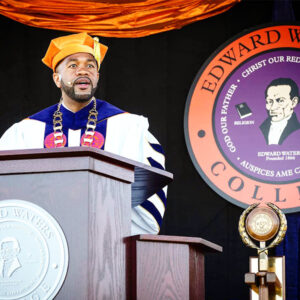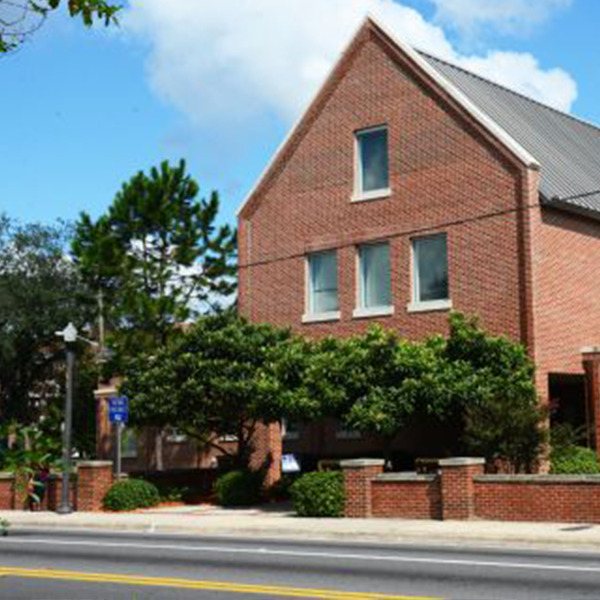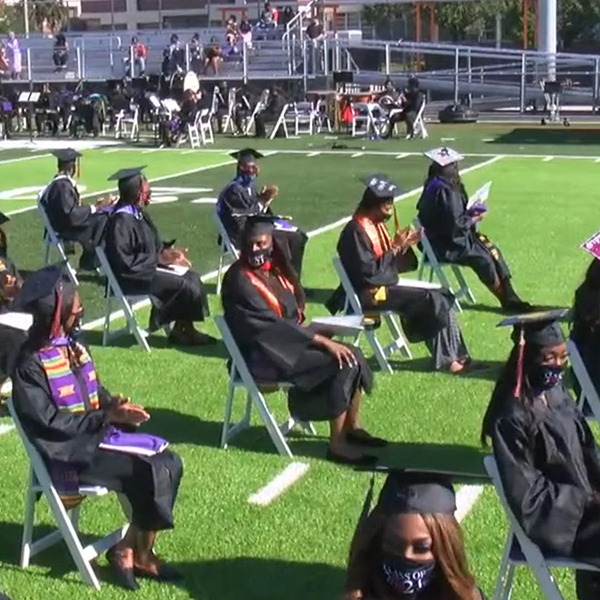Unlocking Limitless Possibility at Edwards Waters College
View more stories from our 2020 Annual Report
The history of Edwards Waters College (EWC) is one of continually creating opportunities out of the challenges. Now stepping into its strongest financial position in years, the possibilities of its legacy of excellence for its students and community seem limitless.
 EWC, located in the Northwest neighborhood of Jacksonville, Florida, was founded in 1866 by the African Methodist Episcopal (AME) Church to educate the formerly enslaved and provide educational opportunities for students of color. The College was Florida’s first independent institution of higher education and first Historically Black College or University (HBCU). Today, EWC remains one of only four HBCUs still affiliated with the AME Church.
EWC, located in the Northwest neighborhood of Jacksonville, Florida, was founded in 1866 by the African Methodist Episcopal (AME) Church to educate the formerly enslaved and provide educational opportunities for students of color. The College was Florida’s first independent institution of higher education and first Historically Black College or University (HBCU). Today, EWC remains one of only four HBCUs still affiliated with the AME Church.
From its founding through the 1970s, EWC was the only place in the community that African-Americans could access higher education and professional career pathways. While the options have increased, the hurdles for students of color, particularly those who are first-generation college students, remain high.
As EWC’s students come predominantly from disadvantaged populations, 90% of them receive Pell grants. That figure is significantly higher than the already high average for HBCUs, which is 75%. Disparities in federal and state funding and discriminatory lending practices have also had lasting and compounded effects on HBCUs, whose financial assets and resources are notably less than those of non-HBCUs. The number of students requiring aid combined with the historic disadvantages of HBCUs in comparison with non-HBCUs, have created significant challenges for EWC.
HBCU graduates account for nearly 40% of Black engineers, 85% of Black doctors, and 50% of Black attorneys. As such, the financial hurdles faced by HBCUs overall potentially presents an economic challenge for the Black community overall and American society as a whole.
EWC’s position as a gateway to increased economic opportunity for people of color in and around Jacksonville has contributed to the College’s standing as a bedrock in the community.
Dr. A. Zachary Faison, Jr., EWC’s President and CEO, describes the relationship between the institution and the Northwest Jacksonville community as “synergistic.” In fact, he shared, there is a long-time saying on campus, “So goes Edward Waters College, so goes the Northwest Jacksonville community. ”
Financial Reckoning
When Faison assumed the college presidency in 2018, he knew that EWC’s funding model needed to change to successfully keep pace with the work needed to continue providing high quality education to its students.
“We had faced consecutive years of being in a challenging financial position, in large part because of what our mission was and who our primary customers are,” said Faison. “We needed to change our business model as an organization. And we’ve begun to do that, while keeping our eye on our historic mission.”
Faison knew about Reinvestment Fund’s work with Fisk University through conversation with its immediate past president. Knowing that EWC’s plans were analogous with Reinvestment Fund’s strategic goals, the institution took a chance and got in touch.
“We reached out and said, we’d like an opportunity to share with you what we’re doing at Edward Waters, our growth model, and our vision,” Faison recalled.
After highlighting the deep impact of its work with students and community members, a financial partnership was forged. The partnership enabled EWC to refinance its existing debt at more favorable rates, provide long-term financing, increase the College’s liquidity and allow for improved forecasting. The investment augments EWC’s $1.8 million endowment, significantly increasing the institution’s long-term financial health, and positioning it for a capital improvement campaign to upgrade its campus learning and living facilities.
Community Synergy
Northwest Jacksonville has faced significant economic challenges over the years, including a decline in economic development investments. Residents face a lack of affordable housing, limited access to healthcare, and live in the middle of a food desert. EWC has been a steadfast partner with its neighbors. “EWC has been the conduit to step in and not only be an advocate for citizens in the community, but also be a central and primary resource provider when it comes to access to health care and equitable food options,” said Faison.
EWC’s campus is home to the Schell-Sweet Community Resource Center, which has served as a support for education, support, and wellness for Northwest Jacksonville’s senior citizens and families for over twenty years. Seniors enjoy programs that keep them energized and engaged with the neighborhood. Through partnerships with local stores, groceries are provided to residents without cars, helping them avoid hours-long trips on public transportation to get to the nearest Walmart.
The College also features the Center for Health Disparities, which provides preventive medical care to community members, and is led by the school’s biology professors. Health screenings result in access to the preventive care that is otherwise unavailable. During the COVID-19 pandemic, the center and its staff epidemiologist have been life-saving assets. “Waters has been a leading resource in terms of distributing and disseminating accurate information,” Faison shared. “When you’re looking at the overwhelming number of African-Americans and Hispanics that are being impacted because of the comorbidities in this crisis, we have to message the right way to these particular communities.”
EWC knew its long-standing relationship with Jacksonville’s Northwest community could make a profound difference in helping the community navigate the pandemic. The College reached out to local and state officials to explain the significance of this reality. “We said, ‘If we want to get African Americans vaccinated, then it’s going to be important that you place the vaccinations in their communities,” Faison said.
At the end of February 2021, EWC was the first historically black college or university in Florida named as a permanent COVID-19 vaccination site. Its site is one of the few in the state open seven days a week, vaccinating 3,000 people each day.
“This partnership allows us to buttress our financial position…It’s a springboard for us as an institution to experience the kind of growth we want to experience in our academic and outreach programs. It allows us to realize the promise of what we consider to be a very limitless future.”
— DR. A. ZACHARY FAISON, JR., PRESIDENT OF EDWARD WATERS COLLEGE
Changing Fortunes
Faison describes the results of the partnership with Reinvestment Fund in a single word: transformative. “It has informed our ability to not only be transformative in our impact with our students and our academic programs, but it also has transformed our ability to be more impactful in our community.”
“This partnership allows us to buttress our financial position,” Faison reflected.” It’s a springboard for us as an institution to experience the kind of growth we want to experience in our academic and outreach programs. It allows us to realize the promise of what we consider to be a very limitless future.”
For the first time in over a decade, the College achieved a net cash surplus at the end of its fiscal year. Faison believes that the vaccination site on campus would not have been possible without the strengthened financial position. And for the first time in 155 years, Edward Waters College may soon be known as Edward Waters University. The College has submitted its first master’s degree program in business administration for accreditation, which will be a 100% online program.
That’s not the only exciting news on the academic front for EWC. “We are also on the precipice of rolling out three new undergraduate programs: one in Computer and Information Science, one in Forensic Science, and one in Social Work,” Faison proudly stated.
For the Northwest Jacksonville community with whom the College shares so much, the Reinvestment Fund partnership means that change is on the horizon. EWC is investing in transforming vacant and blighted properties to create new housing in surrounding neighborhoods.
With financial health comes a new energy of abundance and possibility as EWC embarks on more history-making moves. The College’s improved financial standing has opened a world of possibility for EWC’s students, Jacksonville’s Northwest, and the institution itself.


